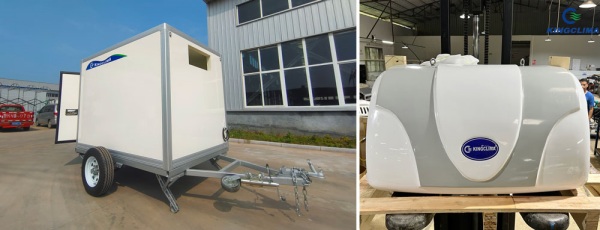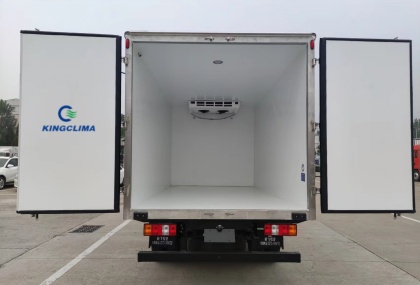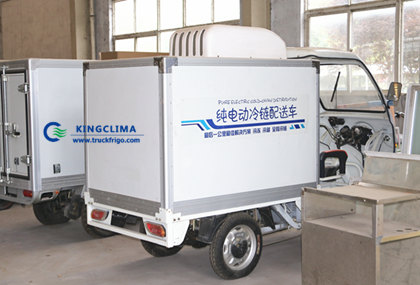How to increase van refrigeration units
Increasing the service life of van refrigeration units requires a combination of proper maintenance, optimal operation, and attention to environmental factors. These units are essential for transporting temperature-sensitive goods, so keeping them in good condition is critical. Below are some effective strategies to maximize the lifespan of van refrigeration units:
1. Regular Maintenance
- Scheduled Servicing: Ensure that the unit is serviced according to the manufacturer’s recommended intervals. Regular professional checks will help detect early signs of wear or malfunction.
- Check Refrigerant Levels: Low refrigerant levels can cause the compressor to overwork, leading to premature failure. Regularly inspect and top off refrigerant levels as necessary.
- Clean Filters: Dirty or clogged filters can restrict airflow and reduce efficiency. Clean or replace air filters regularly, especially in dusty or high-pollen environments.
- Inspect the Condenser Coils: Condenser coils should be cleaned and free of debris. Dirt and dust can decrease the unit's efficiency and overheat the system.
- Lubricate Moving Parts: Regular lubrication of compressor bearings and fans will reduce friction and wear, prolonging the life of the components.
2. Proper Usage and Operation
- Avoid Overloading: Overloading the cargo area can increase the demand on the refrigeration unit. Ensure the unit is used within its designed capacity to prevent overheating and excessive wear.
- Minimize Temperature Fluctuations: Allow the van’s refrigeration unit to maintain a consistent temperature. Frequent temperature cycling (e.g., setting temperatures too high or low) can cause strain on the compressor and other components.
- Turn Off the Unit When Not in Use: If the refrigeration system is not needed (e.g., during breaks or when the vehicle is stationary for extended periods), turn it off to avoid unnecessary wear.
- Optimal Temperature Settings: Avoid setting the temperature too low. Keeping it at the optimal temperature (according to the product being transported) reduces stress on the compressor and system components.

3. Insulation and Sealing
- Check Door Seals: Worn-out door seals or gaskets can lead to temperature loss and cause the refrigeration system to work harder than necessary. Inspect and replace door seals regularly.
- Maintain Cargo Area Insulation: Proper insulation helps maintain the desired temperature and reduces the strain on the refrigeration system. Ensure the cargo space is insulated and free from gaps or damage.
- Avoid Frequent Door Openings: Minimizing the number of times the doors are opened helps retain the internal temperature, reducing the need for the refrigeration unit to work harder.
4. Monitor System Performance
- Regular Temperature Monitoring: Keep an eye on the temperature inside the cargo space using digital thermometers or IoT-based sensors. Early detection of any deviations in temperature can prevent unnecessary strain on the refrigeration unit.
- Use Smart Monitoring Systems: Install telematics or IoT-enabled devices that can monitor the refrigeration unit remotely. These systems can alert you to problems before they become major issues, such as irregular temperature fluctuations, high power consumption, or system malfunctions.
5. Addressing Electrical and Mechanical Issues Promptly
- Inspect Electrical Components: Regularly check wiring, connectors, and fuses to ensure there are no electrical issues. Overloaded circuits or short circuits can damage the compressor or other components.
- Monitor the Compressor: The compressor is the heart of the refrigeration system, so it’s important to ensure it’s running smoothly. Listen for unusual noises (such as grinding or rattling) that could indicate a malfunction.
- Check for Leaks: Refrigerant leaks can lower system efficiency and damage the compressor. Inspect for leaks and ensure any issues are repaired immediately.
6. Environmental Considerations
- Protection from Extreme Weather: Try to park the van in shaded or sheltered areas to avoid prolonged exposure to extreme heat or cold. High ambient temperatures can cause the refrigeration system to overwork, while extreme cold can affect the refrigerant and lubrication.
- Avoid Dusty or Corrosive Environments: When operating in harsh environments (such as construction sites or coastal areas), take extra care to protect the refrigeration system from excessive dust or salt, which can corrode the components. Clean the unit regularly in such environments.
.jpg)
7. Use the Right Refrigerant
- Ensure Proper Refrigerant Type: Use the correct refrigerant as specified by the manufacturer. Using the wrong type of refrigerant can damage components and reduce the system's efficiency.
- Refrigerant Charging: Only trained technicians should charge or top off refrigerant levels. Overcharging or undercharging can lead to poor performance and premature wear on system components.
8. Regular Defrosting
- Avoid Ice Build-up: If the refrigeration system has a defrost feature, make sure it is functioning properly. Ice build-up on the evaporator coil can reduce efficiency and cause damage over time. If the unit does not have an automatic defrost cycle, schedule manual defrosting as needed.
9. Invest in Quality Parts
- Use High-Quality Replacement Parts: If any parts of the refrigeration unit need replacement, make sure to use high-quality, manufacturer-approved parts. Substandard components may not be as durable and can lead to premature breakdowns.
- Upgrade to More Efficient Systems: If your van refrigeration unit is outdated or showing signs of wear, consider upgrading to a newer, more efficient model. Modern units use less energy, operate more quietly, and have improved longevity.
10. Operator Training
- Train Drivers and Operators: Ensure that those who operate the refrigeration system are properly trained. Proper handling of the unit, including the correct startup and shutdown procedures, will prevent unnecessary strain on the system.
- Educate About Loading and Unloading: Provide guidelines for loading the van to ensure that air circulation isn’t blocked and the cargo area remains well-ventilated. Proper loading and unloading techniques prevent excessive wear on the refrigeration unit.
Conclusion
The service life of a van refrigeration unit can be significantly extended with proper care, regular maintenance, and optimal usage. By keeping the system well-maintained, avoiding overuse, monitoring its performance, and ensuring the environment is conducive to its efficient operation, you can maximize its lifespan while maintaining the integrity of temperature-sensitive goods. As a van refrigeration unit supplier, Kingclima offer 7*24 professional and patient help, if you need, please contact us at any time.

.jpg)


